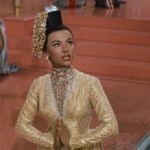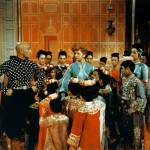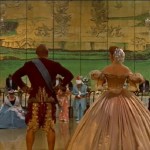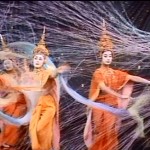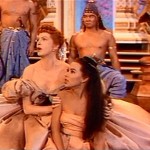
The King and I – 1956
This is one of those musicals that I have seen many times. I know the story, the characters, and the actors. I have my favorite parts and my not-so-favorite parts. I remember first seeing The King and I as a young child, and it was one of the films that made me love the musical genre. I like the music, the dancing, and the theatrical nature of the film.
The King and I was based on the Rogers and Hammerstein stage musical, which had the same name. That was, in turn, based on Anna and the King of Siam, written by Margaret Langdon. The story, is a simple one. Anna, played by Deborah Kerr, and her son Louie, played by Rex Thompson, arrive in Siam by boat. Anna has been hired by the King of Siam to be a school teacher to his many children and wives. She falls in love with the children, though she has difficulty dealing with the strange country’s customs and beliefs.
The King, played by Yule Brynner, is a hard and haughty man on the outside, but a slightly insecure and soft-hearted man on the inside. He has been born into a life in which he always gets his way, with slaves catering to his slightest whim. But when Anna and her Western ideals refuse to be treated as a servant, the two personalities clash.
Eventually, they learn respect for each other, and maybe fall a little bit in love. But a situation arises in which, Anna defies him and breaks his spirit. The King’s pride is wounded. He starves himself and dies, knowing that the heir to his throne will bring a new and more enlightened era to Siam.
The actors were all very well cast. True, the film broke the cardinal sin of movie making, showing us overwhelming cuteness in the form of Anna’s pupils, but at least it was a plot point. When the King goes back on a promise, and Anna threatens to leave, he parades his overly-cute children in front of her. She is instantly won over by the darling little Siamese children and agrees to stay.
The dancing was very well choreographed by Jerome Robinson, the same man who choreographed the film West Side Story. Robinson was obviously an insanely talented choreographer. His dance steps seemed to help tell the story. Nowhere is this more evident than the play within a play, the Uncle Tom’s Cabin sequence.
This was really my favorite scene of the movie. Rita Moreno, playing the part of Tuptim, a slave who has been given to the King as a wife, despite her love for another man, narrates a staged production of the book by Harriet Beecher Stowe, which is a story of slaves that are mistreated by a wicked master. The story was presented using traditional Siamese ballet. The costumes and props were fascinating to watch, and the strange singing of the chorus was wonderful and exotic. For me, the scene was captivating to watch and I love every minute of it.
The subplot of the romance between Tuptim and her lover, Lun Tha, played by Carlos Rivas, was mildly interesting, and wouldn’t have been very intriguing, except it was also a necessary aspect of the main plot of the film. And of course, the most famous song from the show, Getting to Know You, is always superbly delightful, and I enjoy watching it, despite myself. The children were almost sickeningly sweet, but I didn’t mind it so much. It is still a charming scene.
But all that being said… Thank goodness for Marnie Nixon! She does it again! It seems that no matter what musical you are watching from the 1950s or 1960s, she was dubbing the leads, except maybe for Julie Andrews in The Sound of Music. Her talent was amazing in that she had the uncanny ability to sound just like whatever actress she was dubbing, making it difficult to tell they were being dubbed. Unfortunately, the same cannot be said for Rueben Fuentes, the man who dubbed Lun Tha’s song. I don’t know how I could have ever missed it, but it was so obvious that he was not the one singing, I was very nearly cringing. Still, it is a fun film that is a pleasure to watch.



